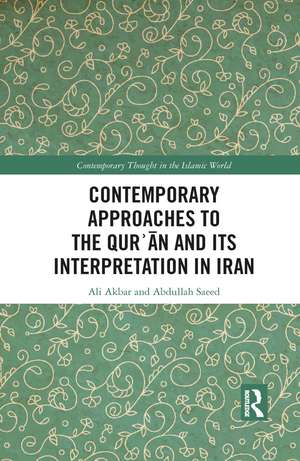Contemporary Approaches to the Qurʾan and its Interpretation in Iran: Contemporary Thought in the Islamic World
Autor Ali Akbar, Abdullah Saeeden Limba Engleză Paperback – 30 iun 2021
Examining issues such as the status of women, democracy, freedom of religion and human rights, this book analyses the theoretical contributions of several Iranian scholars, some of which are new to the English-speaking academy. The hermeneutical approaches of figures such Abdolkarim Soroush, Muhammad Mojtahed Shabestari, Mohsen Kadivar, Hasan Yousefi-Eshkevari, Abolqasem Fanaie and Mostafa Malekian are presented and then analysed to demonstrate how a contextualist approach to the Qu’ran has been formed in response to the influence of Western Orientalism. The effect of this approach to the Qu’ran is then shown to have wide-ranging effects on Iranian society.
This study reveals Qu’ranic thought that has been largely overlooked by the West. It will, therefore. Be of great use to academics in Religious, Islamic and Qurʾānic studies as well as those studying the culture of Iran and the Middle East more generally.
| Toate formatele și edițiile | Preț | Express |
|---|---|---|
| Paperback (1) | 383.12 lei 43-57 zile | |
| Taylor & Francis – 30 iun 2021 | 383.12 lei 43-57 zile | |
| Hardback (1) | 1000.27 lei 43-57 zile | |
| Taylor & Francis – 30 oct 2019 | 1000.27 lei 43-57 zile |
Preț: 383.12 lei
Nou
Puncte Express: 575
Preț estimativ în valută:
73.31€ • 76.74$ • 61.02£
73.31€ • 76.74$ • 61.02£
Carte tipărită la comandă
Livrare economică 31 martie-14 aprilie
Preluare comenzi: 021 569.72.76
Specificații
ISBN-13: 9781032087061
ISBN-10: 1032087064
Pagini: 204
Dimensiuni: 156 x 234 x 11 mm
Greutate: 0.3 kg
Ediția:1
Editura: Taylor & Francis
Colecția Routledge
Seria Contemporary Thought in the Islamic World
Locul publicării:Oxford, United Kingdom
ISBN-10: 1032087064
Pagini: 204
Dimensiuni: 156 x 234 x 11 mm
Greutate: 0.3 kg
Ediția:1
Editura: Taylor & Francis
Colecția Routledge
Seria Contemporary Thought in the Islamic World
Locul publicării:Oxford, United Kingdom
Public țintă
Postgraduate, Professional, and UndergraduateCuprins
Part I: Introduction and Reception of Western Scholars’ Approaches to the Qurʾān in Iran
Introduction
Chapter 1. Reception of Western Scholars’ Approaches to the Qurʾān in Iran: Orientalism Refuted
Part II: Approaches of Contextualist Iranian Scholars towards Interpretation of the Qurʾān
Chapter 2. Abdolkarim Soroush
Chapter 3. Muhammad Mujtahed Shabestari
Chapter 4. Hasan Yousefi-Eshkevari
Chapter 5. Mohsen Kadivar
Chapter 6. Abolqasem Fanaei
Chapter 7. Mostafa Malekian
Part III: Contextualist Approaches in Practice
Chapter 8. Gender Issues
Chapter 9. Pluralism and Freedom of Religion
Chapter 10. Human Rights, Democracy and Methods of Governance
Part IV: Concluding Remarks
Introduction
Chapter 1. Reception of Western Scholars’ Approaches to the Qurʾān in Iran: Orientalism Refuted
Part II: Approaches of Contextualist Iranian Scholars towards Interpretation of the Qurʾān
Chapter 2. Abdolkarim Soroush
Chapter 3. Muhammad Mujtahed Shabestari
Chapter 4. Hasan Yousefi-Eshkevari
Chapter 5. Mohsen Kadivar
Chapter 6. Abolqasem Fanaei
Chapter 7. Mostafa Malekian
Part III: Contextualist Approaches in Practice
Chapter 8. Gender Issues
Chapter 9. Pluralism and Freedom of Religion
Chapter 10. Human Rights, Democracy and Methods of Governance
Part IV: Concluding Remarks
Notă biografică
Ali Akbar is a Research Assistant at the University of Melbourne, Australia.
Abdullah Saeed is the Sultan of Oman Professor of Arab and Islamic Studies at the University of Melbourne, Australia, and Director of the National Centre of Excellence for Islamic Studies.
Abdullah Saeed is the Sultan of Oman Professor of Arab and Islamic Studies at the University of Melbourne, Australia, and Director of the National Centre of Excellence for Islamic Studies.
Descriere
This book sets out how contemporary Iranian scholars have approached the Qurʾān during recent decades. It particularly aims to explore the contributions of scholars that have emerged in the post 1979-revolution era, outlining their primary interpretive methods and foundational theories regarding the reading of the Qurʾān.






